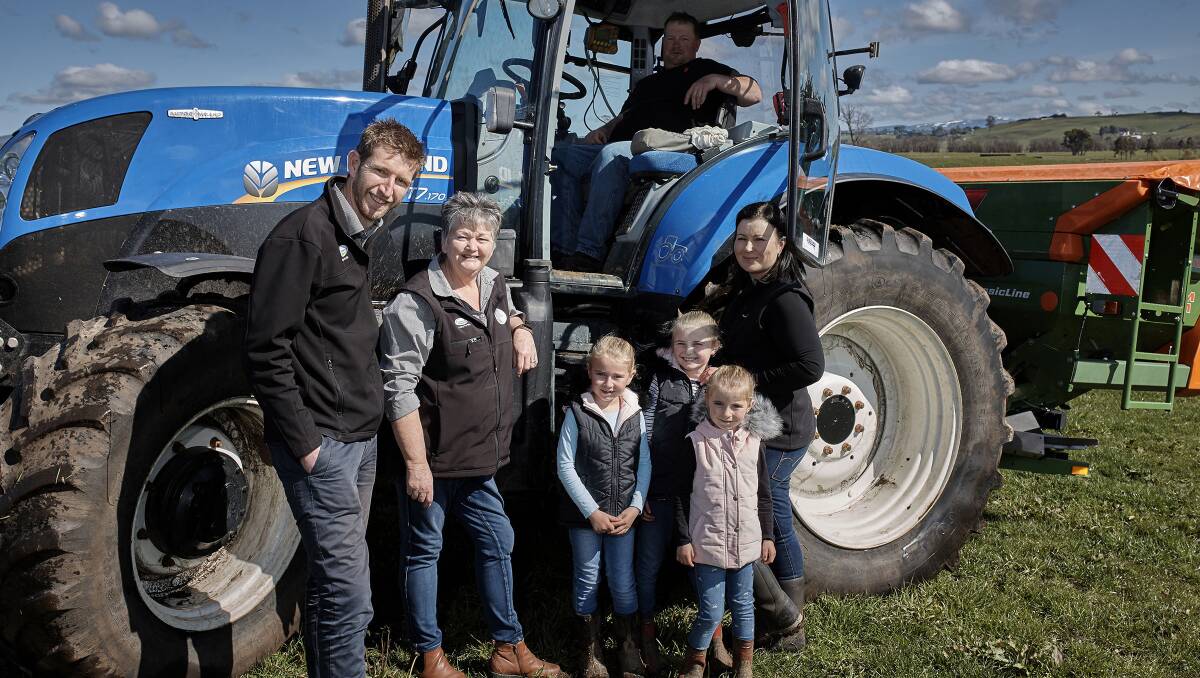
The road to farm ownership was easier than Damien and Brooke Cocker imagined but had all the twists and turns of every legendary quest.
The young family bought a 136-hectare dairy farm at Sheffield in north-west Tasmania a year ago but only moved in this July.
It was a dream come true for 38-year-old Damien and 30-year-old Brooke.
"Ever since I could walk, I've been, or wanted to be, farming," Mr Cocker said.
He spent two-and-a-half years as a trainee at Wilmot before becoming an apprentice at Rushy Lagoon.
After finishing that apprenticeship, Mr Cocker managed a dairy farm, before a stint as second-in-charge for Grant Archer and then moving into cropping before a new job changed everything.
"Five years ago, I saw a share-farming job come up at Rushy and thought, 'That's for me,' and haven't looked back," he said.
The Cockers share-milked 1500 to 1600 cows for five seasons in two rotary dairies at Rushy Lagoon in the north-east of the state before deciding to look for their ideal first property.
"It had to have scope for irrigation, be big enough that there was potential to employ people, not be landlocked so there was the ability to expand and it had to have a reasonable house or one that could be made reasonable," Mr Cocker said.
The couple sought advice from other farmers and leveraged off-farm expertise, too.
"I talked to a few of my old bosses that had bought farms," he said.
"Fonterra were really good at doing some budgets up for me for different properties that we looked at and I asked them for advice, too."
Related reading:
Speaking to the bank early had been pivotal.
"Getting finance was easier than I thought," he said.
"About 12 months prior to buying the farm, we talked to the bank and said that, in three years, we wanted our own farm and asked what we'd need to do to get it.
"We made a plan, did some budgets and stuck to them.
"That meant we'd built up a good relationship before we found the farm, which made a big difference."
Central to the farm ownership plan was Ms Cocker's calf-rearing excellence.
"Brooke's our number one calf-rearer," he said.
"We really were able to buy the farm because she reared so many surplus calves at Rushy Lagoon."
The couple grew out heifers on agistment and sold older, in-calf heifers, and yearlings to build a deposit for the property.
After purchasing the farm, the Cockers reared 150 heifers at Sheffield and improved the property, while continuing to sharefarm 2.5 hours away at Rushy Lagoon.
"When we were calving 1400 cows down at Rushy, I'd have to do a run to Sheffield, as well, to feed out," Mr Cocker said.
"That really was the hardest thing about buying the farm."
Ms Cocker's success as a calf rearer was complemented by her husband's love of pasture management.
With an average annual rainfall of more than 1000mm at Sheffield and access to around 100 megalitres of uncharged irrigation water, pasture made up a large percentage of the diet.
The 300 milkers - about half of them are heifers - are on track to produce about 450 kilograms of milk solids a year with a tonne per head of supplementary feed.
"I love growing grass," Mr Cocker said.
"It's a bit hard to say how much we will grow on the new farm yet but my key emphasis will be identifying which pastures need renewing.
"We redrilled about 40ha this autumn and did quite a few trials of some Bealey and Base grasses, as well as some Shogun, which is more of a four or five-year grass.
"We went with some annuals as well, including a crop of annual grass with a leafy turnip and an oat crop to feed the cows through winter, which was quite successful.
"I'm pretty keen to be able to explore more.
"When you're share farming, you don't always get to make those decisions.
"It's exciting being able to call the shots and look into what people are recommending."
Of course, not everything about the new farm had been a joy.
"Everything that can break down, has," Mr Cocker said.
Aside from the inevitable repairs, the Cockers planned to invest in more irrigation infrastructure, a new dairy and, ultimately, more land.
"Fonterra's brought the growth incentive back in and that's really sold us on supplying them," he said.
"It makes a huge difference to us.
"I still would have bought the farm but it's really helped us out the first year.
"It will help buy irrigators and encourage us to expand and gives us the drive to get bigger and better."
Mr Cocker said he thought dairy farming had a strong future but the challenge was to "farm for the future".
"I think you've got to stay one step ahead," he said.
"This is big tourist area, so do you look at incorporating tourism into your business?
"You've got to be open-minded and keep up with the times."
With a chef as a brother, value-adding by making cheese was a real possibility for the future.
In fact, family also sets the pace for the day, with the couple juggling milking times around the needs of three daughters, aged six to eight.
The couple are out of bed at 3.30am, milking by 4.30am and finished up at 8.30am and are rounding up again at 1.30pm to be finished by 6.30pm.
While their workload does not allow for a lot of downtime just yet, Mr Cocker said the whole family loved to farm together and looked towards a long future in the industry.
"I think dairying and all of agriculture will be really good in the future," he said.
"They don't make any more farmland and they're still making a lot more people, so the demand is always going to outweigh the supply of food."
Read more stories like this on Australian Dairyfarmer


